This topic has been on my mind, especially listening to the last Health and Wellness show on precious snowflakes. The point was brought up that perhaps the precious snowflakes don't have an internal locus of control.
I can see how that would work - something doesn't go your way, throw a tantrum, an external authority takes control of the situation.
An internal authority/locus of control would never be developed if this strategy worked most of the time. The person would be in a constant state of (subconscious) fear of powerlessness, fear of being without an external authority/power and boiling emotions ready to demand the authority take action.
Perhaps someone worked out how to turn neurotics with the potential for internal authority into authoritarian followers?
I think we all have parts of our lives and situations we feel powerless over, that we may then have learned to habitually ignore.
What is interesting in some cases is the apparent complete inversion of assessing reality - feeling you should be able to control the things that are uncontrollable (magical/wishful thinking) and feeling the things that are controlable are in fact uncontrollable (and thus ignoring it).
How to gain some control?
Well being coming from diet, health and (most importantly) how much control you feel you have over your life. So that can be a catch 22.
Life is uncontrollable -> poor well being -> inverted assessment of what is/isn't controllable -> life is uncontrollable (because of trying to control the wrong things).
Some practical steps:
_http://www.thepositiveencourager.global/l-helping-person-develop-locus-control/
Bit of a catch 22 - you need some sense of (internal emotional history of) control in order to gain more. Perhaps seeing that your view may be inverted could help?
I'm curious what peoples score out of 10 is. Mine would be a 5 right now.
I can see how that would work - something doesn't go your way, throw a tantrum, an external authority takes control of the situation.
An internal authority/locus of control would never be developed if this strategy worked most of the time. The person would be in a constant state of (subconscious) fear of powerlessness, fear of being without an external authority/power and boiling emotions ready to demand the authority take action.
Perhaps someone worked out how to turn neurotics with the potential for internal authority into authoritarian followers?
I think we all have parts of our lives and situations we feel powerless over, that we may then have learned to habitually ignore.
What is interesting in some cases is the apparent complete inversion of assessing reality - feeling you should be able to control the things that are uncontrollable (magical/wishful thinking) and feeling the things that are controlable are in fact uncontrollable (and thus ignoring it).
How to gain some control?
The Secret To Emotional Control Most People Don’t Know
http://www.spring.org.uk/2016/11/secret-emotional-control.php
Better emotional control is linked to lower levels of depression and anxiety.
The key to healthy emotional control is to be flexible, new research finds.
People with lower levels of depression and anxiety tend to vary their emotional control strategy successfully depending on whether the situation can be explained.
Dr Peter Koval, one of the study’s authors, said:
“Our results caution against a ‘one strategy fits all’ approach, which may be tempting to recommend based on many previous findings regarding reappraisal as a strategy for regulating emotion.
Simply using any given emotion regulation strategy more (or less) in all situations may not lead to the best outcomes — instead, contextually-appropriate emotion regulation may be healthier.”
For the research, people were tracked over a week.
They were asked to indicate how they managed their emotions and how much control they had over the situation.
People with the highest levels of mental health tended to change their strategy more based on how much control they had.
When they had less control — in other words, they couldn’t change things — they tended to reappraise the situation.
Reappraisal involves thinking about a situation in a different way.
E.g. “I’ve been rejected romantically, but at least I tried, maybe next time I’ll be more lucky.”
But when they had more control — in other words, they could do something about the situation — they tended to avoid thinking differently.
The study’s authors write:
“We found that people with higher well-being increased their use of reappraisal as contexts became less controllable, whereas individuals with lower well-being showed the opposite pattern.” {this is the inversion}
The reason reappraisal is bad when you have control, is that it stops you doing something about the situation.
The study’s authors explain:
“When a situation can be directly changed, reappraisal may undermine the adaptive function of emotions in motivating action.”
When the situation can be changed, it is better to let your emotions — whatever they may be — motivate that change, rather than trying to change the emotions.
When the situation can’t be changed, however, it is better to try and change the emotion.
The study was published in the journal Psychological Science
http://pss.sagepub.com/content/early/2016/10/12/0956797616669086
Well being coming from diet, health and (most importantly) how much control you feel you have over your life. So that can be a catch 22.
Life is uncontrollable -> poor well being -> inverted assessment of what is/isn't controllable -> life is uncontrollable (because of trying to control the wrong things).
Some practical steps:
_http://www.thepositiveencourager.global/l-helping-person-develop-locus-control/
L is for Helping A Person Develop Their Locus Of Control
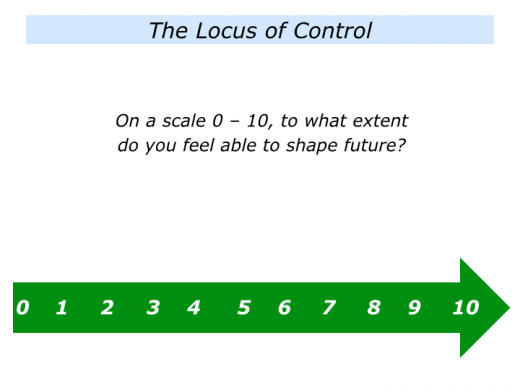
Imagine you are helping a person to shape their future. You may be a teacher, coach, counsellor, mentor or another kind of helper.
Different people use different approaches to help a person in such a situation. Whichever approach they take, however, at some point it will call for the person taking responsibility for making things happen.
There are many tools for helping a person to strengthen their internal locus of control. This is a term coined by Julian Rotter in the 1950s. Let’s explore what this means.
Clarifying a person’s locus of control
A person with an internal locus of control believes they can play a large part in shaping their future. They believe that, whilst external events may bring challenges, they can take an internal decision regarding how they respond to such events.
Such people are positive yet realistic. They focus on what they can control in life, rather than worry about what they can’t control. They say things like:
“I can take responsibility … I can make things happen … I can recover from setbacks.”
People with an external locus of control believe that things happen to them. They often feel that their happiness depends on external events and how the world treats them
Other people may try to help the person, but their suggestions fall on unreceptive ground. The person often finds a reason why the ideas won’t work. They keep saying: “Yes, but …”
If you wish, try tackling the exercise on this theme. This invites you to look at your own life and do the following things.
Describe extent to which you feel able to shape your future. Rate this on a scale 0 – 10.
People who score more than 5/10 are more likely to have an internal locus of control. Those who score less may have an external locus of control.
Describe the specific things you can do to, if you wish, maintain or increase the rating.
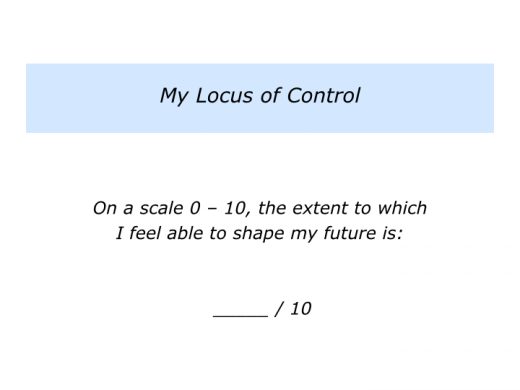
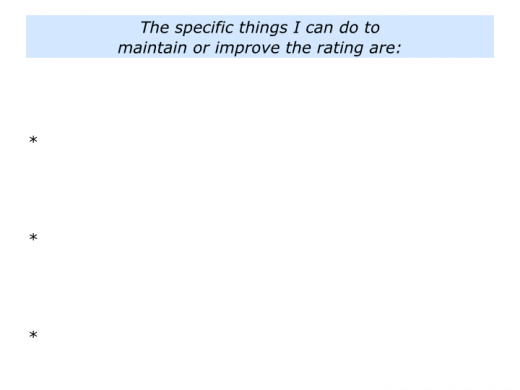
Helping a person to develop their internal locus of control
Imagine that a person has asked for your help. They may be facing a challenge, aiming to overcome a tragedy or wanting to improve their performance.
As mentioned earlier, whichever approach you use it will involve the person taking responsibility. It will call for them saying: “I can …” rather than “I can’t …”
How can you help them to take this step? One approach is to share positive models and practical tools they can use to achieve their picture of success.
People can use such knowledge to reach their goals, but frequently it does not work to simply expose them to such information. Why? It is often transmitted to them from an ‘outside in’ perspective.
The person is told to be positive, apply a particular technique or behave in a certain way. Whilst they might see the intellectual sense in adopting the advice, they still do not feel they can move forward.
So what works? There are several basic rules that work in development.
The person must feel in their gut that:
They want to shape their future.
They can shape their future.
They know how to shape their future.
Bit of a catch 22 - you need some sense of (internal emotional history of) control in order to gain more. Perhaps seeing that your view may be inverted could help?
How can you help them to take these steps? Different people use different approaches.
My own work often involves using The Positive Approach. This aims to provide practical tools that people can use to achieve their picture of success.
Whilst providing practical strategies that work in the real world, the approach is also based on an organic view of development. It includes the following beliefs.
People already have within them the seeds of development.
People already have strengths and successful patterns that have used in the past to achieve their goals.
People can be helped to build on these strengths and successful patterns – plus add other skills – to develop and achieve their goals.
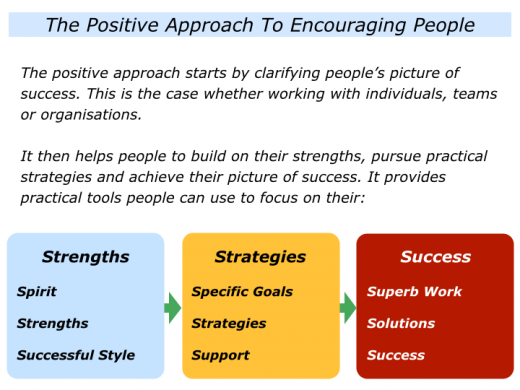
The approach starts by helping people to clarify their picture of success. It then focuses on tapping their inner strength.
There are many ways to help people to take this step. One method is to ask a person questions around the following themes. These can be tailored to match the challenge that the person is facing.
Questions That Can Help A Person To Focus On Their Inner Strength
When have you shown positive spirit? When have you overcome difficult challenges successfully? When have you performed superb work? When have you achieved peak performance?
What did you do right then? What were the principles you followed? What did you actually to do to reach your goals? How can you follow some of these principles in the future?
Bearing in mind the challenge you face now, how can you build on what you know works? You have succeeded in the past. How can you follow some of those principles – plus maybe add other skills – to tackle this challenge?
Looking ahead, what is the first goal you want to achieve? What will be the benefits of achieving the goal? How can you do your best to achieve the goal? How can you get an early success?
Looking further ahead, what are the key strategies you can follow to give yourself the greatest chance of success? How can you encourage yourself on the journey? How can you focus on getting three successes each day?
You will have your method of helping a person to develop their inner strength and locus of control. Whichever approach you use, however, it can also be useful to invite them to do the classic exercise on Controlling The Controllables.
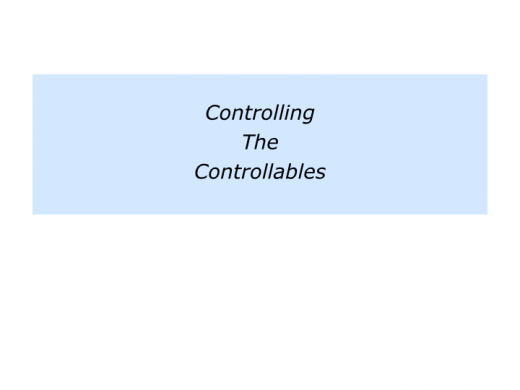
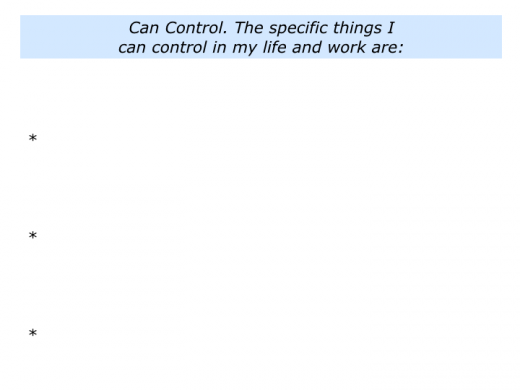
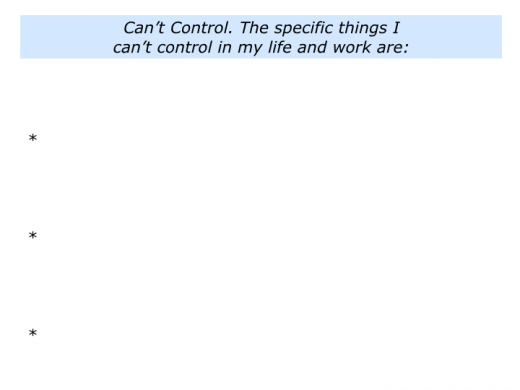
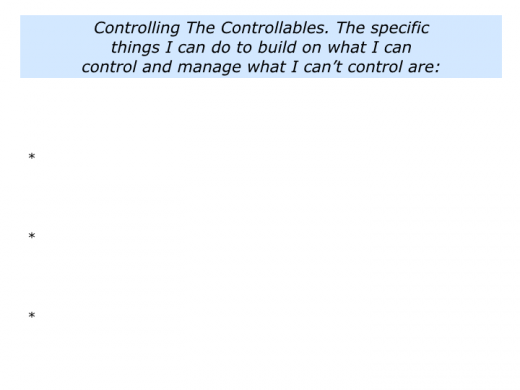
Looking at my own life, for example, I did this exercise when seeking treatment for prostate cancer.
I could control my attitude – such as focusing on my purpose in life – the steps I took to exploring various treatments and the decision about which treatment to embark upon.
I could not control that I had been diagnosed with the illness. I was fortunate, however, inasmuch that I had been doing annual health checks. This flagged up the illness at an early stage, thus increasing the chances of success.
It was then up to me to build on what I could control and manage what I couldn’t. This eventually led to seeking out and getting non-invasive treatment from a superb surgeon. So far the outcome has been successful.
You will have your own approach and exercises for helping a person to develop their inner locus of control. Helping them to take these steps increases the chances of success.
If you wish, try tackling the exercise on this theme. This invites you to do the following things.
Describe the specific situation in which you would like to help a person to, if appropriate, develop their locus of control.
Describe the specific things you can do to help them to develop their locus of control.
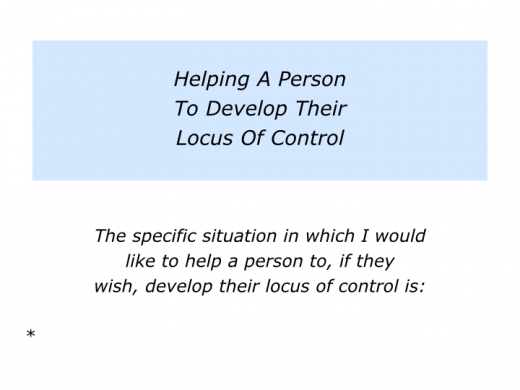
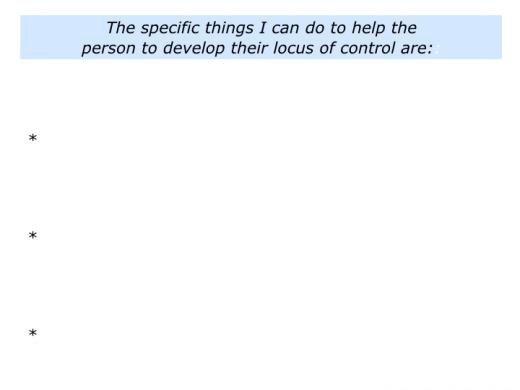
I'm curious what peoples score out of 10 is. Mine would be a 5 right now.

 Because who knows, maybe "better conditions" for humanity don't exist yet, unless we make it possible? After all, the idea is to create a different kind of reality, not to dwell on holding grudges over the existing one.
Because who knows, maybe "better conditions" for humanity don't exist yet, unless we make it possible? After all, the idea is to create a different kind of reality, not to dwell on holding grudges over the existing one. 